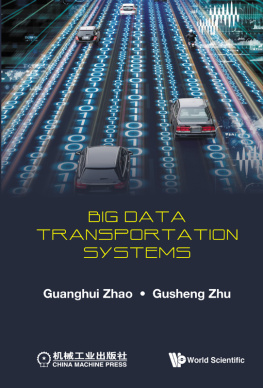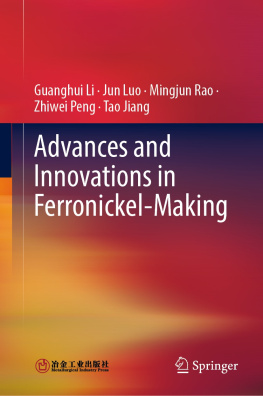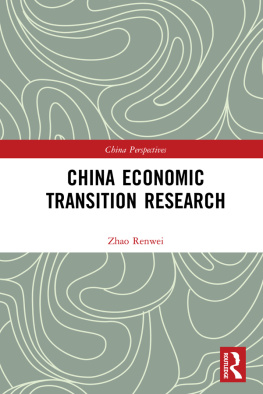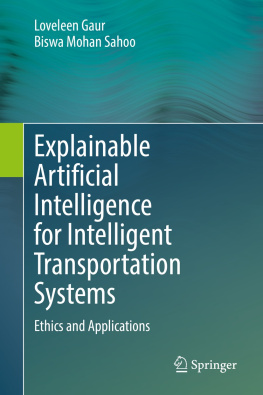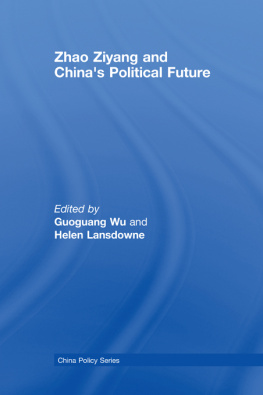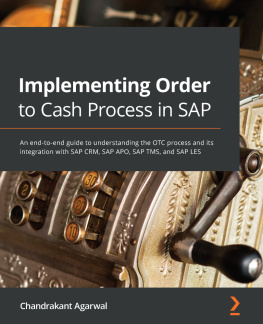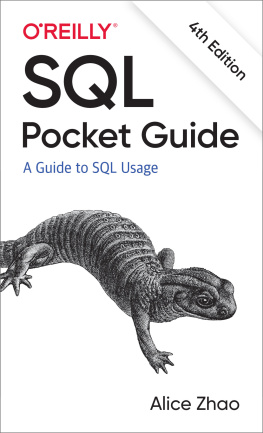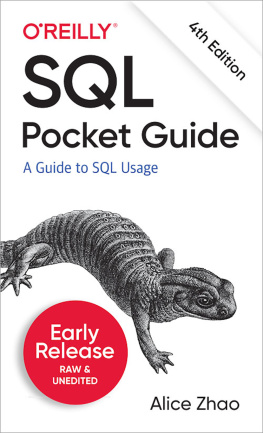Zhao Guanghui - Big Data Transportation Systems
Here you can read online Zhao Guanghui - Big Data Transportation Systems full text of the book (entire story) in english for free. Download pdf and epub, get meaning, cover and reviews about this ebook. year: 2021, publisher: World Scientific Publishing Company, genre: Politics. Description of the work, (preface) as well as reviews are available. Best literature library LitArk.com created for fans of good reading and offers a wide selection of genres:
Romance novel
Science fiction
Adventure
Detective
Science
History
Home and family
Prose
Art
Politics
Computer
Non-fiction
Religion
Business
Children
Humor
Choose a favorite category and find really read worthwhile books. Enjoy immersion in the world of imagination, feel the emotions of the characters or learn something new for yourself, make an fascinating discovery.
- Book:Big Data Transportation Systems
- Author:
- Publisher:World Scientific Publishing Company
- Genre:
- Year:2021
- Rating:5 / 5
- Favourites:Add to favourites
- Your mark:
- 100
- 1
- 2
- 3
- 4
- 5
Big Data Transportation Systems: summary, description and annotation
We offer to read an annotation, description, summary or preface (depends on what the author of the book "Big Data Transportation Systems" wrote himself). If you haven't found the necessary information about the book — write in the comments, we will try to find it.
Big Data Transportation Systems — read online for free the complete book (whole text) full work
Below is the text of the book, divided by pages. System saving the place of the last page read, allows you to conveniently read the book "Big Data Transportation Systems" online for free, without having to search again every time where you left off. Put a bookmark, and you can go to the page where you finished reading at any time.
Font size:
Interval:
Bookmark:

[1]Lu Guangming. Ningbo Builds Intelligent Transportation Management System. Peoples Public Security Daily, Traffic Safety Weekly, August 18, 2017, p. 2.
[2]Li Haifeng and Ma Xiaolei. Youth Mainstay of Transportation Big Data. Science and Technology Daily, October 10, 2017, p. 6.
[3]Liu Qi. Big Data Tells You Why the Traffic Accident Happened. Changsha Evening News, April 8, 2017, p. 7.
[4]Lin Gang. Qingdao Intelligent Parking Comprehensive Platform was Launched. Qingdao Daily, July 27, 2017, p. 4.
[5]Luo Yunhui, Li Lin, and Qi Wenzhou. Research on Single Point Traffic Signal Timing Optimization Strategy Based on Big Data. Highway and Automobile Transportation, 2017 (04): 2227.
[6]Xu Jihua, Feng Qina, and Chen Zhenru. Smart Government: The Coming of the Era of Big Data Governance, Beijing: CITIC Press, 2014.
[7]Zhang Xiaoming. War Heat, Not just Physical Work. Wen Wei Po, July 13, 2017, p. 2.
[8]Li Kun. Build a World Intelligent Platform to Help the Coordinated Development of Beijing, Tianjin and Hebei. China Reform News, July 3, 2017, p. 7.
[9]Yan Wei. Research on Transportation Big Data and Application Technology. Tianjin Electronic Industry Association. Proceedings of 2017 Annual Meeting of Tianjin Electronic Industry Association. Tianjin Electronic Industry Association: 2017, p. 4.
[10]Xu Zongben. Academician of Chinese Academy of Sciences, Professor of Xian Jiaotong University, Using Big Data Well Requires Great Wisdom. China Education Network, 2017 (06): 3132.
[11]Hu Jihua, Gao Lixiao, and Liang Jiaxian. OD Matrix Inference Method of Bus Routes Based on Transportation Big Data. Science Technology and Engineering, 2017 (11): 309314.
[12]7its.com. Wechat Official Platform: The Current Situation, Application and Benefits of the Construction of Changsha Intelligent Transportation System, November 30, 2017.
[13]Zhao Bingyu. Meet the Big Transportation in the Era of Big Data. Yanan Daily, July 17, 2017, p. 1.
[14]Yu Shuo and Li Zeyu. Research on Transportation Big Data and Application Technology. China High Technology Enterprises, 2017 (04): 9091.
[15]Xia Huan, Editor in Chief. Collection of Smart City Industry Solutions Centered on Data, Wuhan: China University of Geosciences Press (2016), p. 11.
[16]Xiao Ziqian, Chen Jingyou, and Fu Shi. Overview of the Development of Intelligent Transportation System in the Context of Big Data. Software Guide, 2017 (01): 182184.
[17]Zhao Guanghui. Thoughts on the Development of Big-data Transportation in the Context of Internet +. Logistics Technology, 2016 (06): 1924.
[18]Zhang Bin, Mao Lin, and Zhang Yiwen. Research on the Application Relevance of Traffic Big Data based on Real-time Road Condition. Henan Science and Technology, 2016 (11): 108110.
[19]Yan Junwei, Ling Weiqing, and Wang Jian. An Ontology Based Transportation Big Data Analysis Framework. Computer Knowledge and Technology, 2016 (01): 2527.
[20]Zhang Hong, Wang Xiaoming, Guo Xiucheng, Cao Jie, Zhu Xusheng, and Guo Yirong. Application of GPS Trajectory Big Data of Taxi in Intelligent Transportation. Journal of Lanzhou University of Technology, 2016 (01): 109114.
[21]Chen Tao. Research on the Application of Big Data in Intelligent Transportation System. Intelligent City, 2016 (02): 3637.
[22]Chen Ran. Analysis Framework of Transportation Big Data Based on Ontology. Technology and Economic Guide, 2016 (06): 27.
[23]Zhang Zi. Big Data Helps Guiyang Intelligent Transportation. Computers & Internet, 2015 (19): 9.
[24]Tian Qiang. Highlight the Advantages of Big Data Application and Innovate the Three-Dimensional Prevention and Control System. Peoples Public Security Daily, Traffic Safety Weekly, October 9, 2015, p. 3.
[25]Hu Caiyi and Yang Xinmiao. Hub Information Service of Integrated Transportation Based on Big Data. Comprehensive Transportation, 2015 (07): 6062.
[26]Bie Kun. Big Data Drives Intelligent Transportation. Computerworld, July 15, 2013, p. A10.
[27]Gao Shudong. Challenges Faced by Commercial Banks in the Era of Big Data Interview with Zhou Yanti, Deputy General Manager of Data Center of Bank of Communications Co., Ltd. Financial Computer of China, 2013 (07): 2224.
[28]Yue Jianming and Yuan Lunqu. Big Data Analysis in the Development of Intelligent Transportation. Productivity Research, 2013 (06): 137138, 165.
[29]Meng Qingfeng. Traffic Problem Solving under Big Data. China Communications News, July 17, 2013, p. 5.
[30]Guo Tao. Big Data All in One Machine Makes Urban Traffic Intelligent. China Information World, December 31, 2012, p. 16.
[31]Chen Mei. Application of Big Data in Public Transportation. Library and Information, 2012 (06): 2228.
[32]Liu Haiyong. Help Intelligent Growth and Cultivate High-end Talents in the Era of Big Data IBM and Beijing Jiaotong University Jointly Release the Joint Talent Training Plan for Information Management. China Education Info, 2012 (19): 89.
Part I covers the understanding big data transportation that includes various application scenarios of big data transportation, the development status of big data abroad, the clarification of the concept of big data transportation, the security issues, and the essence of innovation.
Part II of the book discusses the implementation of the big data transportation, that is, how to import and apply the big data transportation in various fields will be illustrated by cases including competitions of big enterprises in the field of the big data transportation, big data to help public transportation planning, big data transportation and logistics, the future of big data transportation, etc.
The so-called big data transportation means that through the Internet technology and big data technology, the data generated and precipitated in the transportation industry are processed, analyzed, and operated by using data processing tools so as to produce more effective, convenient, and high-value transportation, optimization, and governance programs, bring convenience to peoples travel, improve transportation efficiency, save energy resources, reduce pollution emissions, and optimize the industrial structure.
As the industrial society moves toward the information society, all human achievements are stored and transmitted in the form of binary information, and the information is converted into digital form. Some scholars have divided the informationization process of human society into three eras, namely the computer era, the Internet era, and the big data era.Vehicles, intelligent phones, and tablets, human-produced data are growing exponentially.
The information chart released by MBA online website shows that every day 294 billion emails are sent out, 2 million blogs are published online, 250 million photos are uploaded on Facebook, 8.64 million hours of videos are uploaded on YouTube, and 187 million hours of concerts are played on Pandora, the streaming music website. According to IBMs analysis, 90% of all the data obtained by the entire civilization of mankind were generated within the past two years. By 2020, the scale of data generated in the world will reach 44 times that of today.
Font size:
Interval:
Bookmark:
Similar books «Big Data Transportation Systems»
Look at similar books to Big Data Transportation Systems. We have selected literature similar in name and meaning in the hope of providing readers with more options to find new, interesting, not yet read works.
Discussion, reviews of the book Big Data Transportation Systems and just readers' own opinions. Leave your comments, write what you think about the work, its meaning or the main characters. Specify what exactly you liked and what you didn't like, and why you think so.

